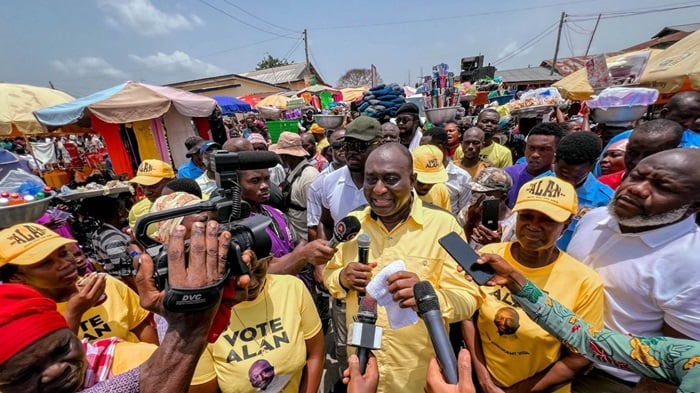The Movement for Change (MfC), spearheaded by Alan Kwadwo Kyerematen, a former stalwart of the New Patriotic Party (NPP), has categorically dismissed any possibility of rejoining the NPP, despite calls from some NPP members for reconciliation and reintegration of former members ahead of the 2028 general elections. The NPP proponents of this reunion strategy argue that bringing back former members, who either left the party or faced suspension, could bolster party unity and strengthen its prospects in the upcoming elections. However, the MfC remains resolute in its decision to chart an independent course, citing fundamental disagreements with the NPP’s current trajectory and leadership style.
Ebo Buckman, a prominent figure within the MfC and a key political strategist, articulated the movement’s stance during an interview on Kumasi-based OTEC 102.9 FM’s political program, Dwabrem. Buckman emphasized that the MfC’s separation from the NPP is not a temporary divergence but a principled stand against what he perceives as deep-seated flaws within the party. He argued that the NPP’s focus should be on internal reform and addressing its own shortcomings, rather than attempting to woo back former members. Buckman’s criticisms targeted the perceived arrogance within the NPP leadership, which he believes contributed significantly to the party’s electoral setbacks and loss of political power. He maintained that reintegrating with such leadership would be counterproductive to the MfC’s goals and principles.
Buckman underscored the MfC’s commitment to building a distinct political identity and pursuing its own vision for Ghana’s future. He expressed unwavering confidence in the movement’s direction and leadership under Alan Kyerematen, asserting that they are better positioned to effect positive change outside the confines of the NPP. He portrayed the MfC as a viable alternative political force, offering a fresh perspective and approach to governance. The movement’s rejection of the NPP’s overtures signals a firm resolve to establish itself as an independent entity in the Ghanaian political landscape.
This unequivocal rejection of reunification underscores the significant rift between the MfC and the NPP. It highlights the deep-seated dissatisfaction with the NPP’s current state among some of its former members, raising questions about the party’s ability to reconcile internal divisions and present a united front in future elections. The MfC’s emergence as a distinct political force adds a new dynamic to the political landscape, potentially reshaping the balance of power and introducing a new dimension to the competition for political influence. The movement’s future trajectory will be closely watched as it seeks to define its platform, attract support, and establish itself as a credible alternative to existing political parties.
The MfC’s decision also reflects the broader trend of political realignment and the emergence of new political formations in Ghana. As the political landscape evolves, existing parties face increasing challenges in maintaining unity and adapting to changing voter preferences. The MfC’s emergence signals a potential shift in the political paradigm, offering an alternative platform for those disillusioned with the established parties. The movement’s success will depend on its ability to articulate a compelling vision, build a strong organizational structure, and mobilize support across diverse segments of the population.
The coming years will be crucial for the MfC as it navigates the complexities of Ghanaian politics and strives to carve a distinct niche for itself. The movement’s ability to translate its vision into concrete policies and programs will be key to its success. Its interaction with other political actors and its ability to build alliances and coalitions will also play a significant role in shaping its future trajectory. The 2028 general elections will serve as a critical test of the MfC’s viability and its ability to translate its nascent political capital into tangible electoral gains. The movement’s performance in these elections will be a key indicator of its long-term prospects and its potential to reshape the Ghanaian political landscape.














